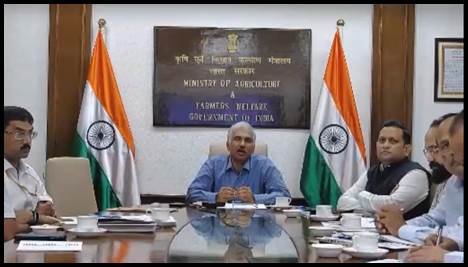DeHaat partners with Global Bio Agri-Input Innovations to drive sustainability for Indian Farmers
The multi-year partnership enables DeHaat to exclusively manage the distribution & sales of six unique formulations patented by GBI and Aussan Labs.
DeHaat, India’s largest full stack AgriTech platform, today announced its strategic partnership with two unique global biological agri-input innovations – GBI (Global BioAg Innovations) and Aussan Laboratories, giving a shot in the arm to the company’s continuous endeavor in offering sustainable solutions to Indian farmers. DeHaat, with existing tie-ups with over 250 agri companies offering a wide range of 3000+ agri input SKUs has extended its outreach to global IPs for the first time.
The multi-year partnership enables DeHaat to exclusively manage the distribution & sales of six unique formulations patented by GBI and Aussan Labs through its exclusive network of 12,000 DeHaat franchise Centers spanning 110,000 villages across 12 Indian states, offering last mile access to over 2 million Indian farmers.
The association is aimed at empowering farmers with the right products & information to combat the changing climatic conditions and establish sustainable agricultural practices. DeHaat aims to facilitate these cutting-edge products that are designed to improve soil health and fortify crops against the adverse effects of climate change. DeHaat has so far partnered with 4 such global innovations, offering access to its large farmers & last mile network and is hoping to extend this success to bring many more global agri solutions to Indian soil.
Speaking about the association, Amrendra Singh, Co-founder, said, “We are thrilled to partner with GBI and Aussan Labs, two of the highly innovative biological & hence environment friendly solutions. This collaboration aims to empower our farmers to adapt to sustainable practices & adopt climate resilient farming. As a ‘Farmers First’ organization, our mission remains to revolutionize the Indian agricultural ecosystem and deliver environment friendly products to our farmers. We are committed towards creating a sustainable future, empowering farmers with latest advancements, improving resource efficiency, and truly making a difference in their lives”.
Roger Tripathi, CEO, GBI, added, “We are keenly looking forward to working with DeHaat and its enormous reach in taking the efficacious GBI products to Indian farmers to make Indian agriculture more sustainable. We will focus on soil health and plant health linkages. Dehaat and GBI share the same passion.”
Sandeep Jayaswal, CEO, Aussan India, said “Our passion is to remove toxic chemicals from the agriculture industry and the food chain in general, as well as to give back to the planet by repairing damaged farm soils by working with nature and not against her. We are super exited to distribute CropBioLife, our Flagship innovation, through DeHaat’s massive network in India. This will enable higher ROI for Indian farmers in an eco-friendly & sustainable manner.”
It is worth noting that Aussan Labs’ flagship product ‘CropBioLife’, which was developed in 2004 after 6 years of development & 100+ trials conducted across the globe of a variety of crops is today certified organic in geographies like US, Canada, Australia & New Zealand, is available in 15 countries and has 6 patents issued or pending against its name. With the association, this innovative product will now be available in India exclusively through the DeHaat network.
The multi-year partnership enables DeHaat to exclusively














